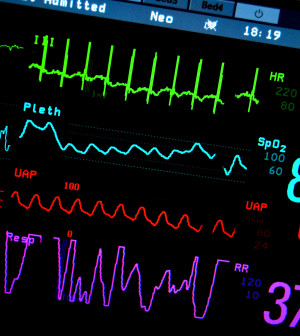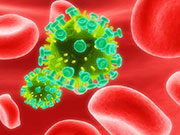- Double Mastectomy May Offer No Survival Benefit to Women With Breast Cancer
- Toxic Lead Found in Cinnamon Product, FDA Says
- Certain Abbott Blood Sugar Monitors May Give Incorrect Readings
- Athletes Can Expect High Ozone, Pollen Counts for Paris Olympics
- Fake Oxycontin Pills Widespread and Potentially Deadly: Report
- Shingles Vaccine Could Lower Dementia Risk
- Your Odds for Accidental Gun Death Rise Greatly in Certain States
- Kids From Poorer Families Less Likely to Survive Cancer
- Tough Workouts Won’t Trigger Cardiac Arrest in Folks With Long QT Syndrome
- At-Home Colon Cancer Test Can Save Lives
Study Adds to Signs Linking HIV to Heart Trouble


Long-term HIV infection is linked to an increased risk of heart disease in men, a new study finds.
For the study, Johns Hopkins researchers looked at 618 HIV-infected men and 383 uninfected men, aged 40 to 70, in the Baltimore/Washington, D.C., Chicago, Pittsburgh and Los Angeles areas.
Study participants who had more advanced HIV and had been taking highly active antiretroviral therapy (HAART — a combination of drugs that target HIV) for a long time were more likely to have plaque buildup in their heart arteries and narrowing of the arteries.
This is called coronary artery disease and can lead to a heart attack, the study authors noted in a Johns Hopkins news release.
Previous research has suggested an association between HIV (the virus that causes AIDS) and heart disease, but the results have been inconclusive, according to the report published in the April 1 issue of the Annals of Internal Medicine.
Knowing about the link between long-term HIV infection and heart disease is important because treatment advances have led to HIV/AIDS patients living much longer, lead author Dr. Wendy Post, a cardiologist and professor of medicine at the Johns Hopkins University School of Medicine, and colleagues pointed out.
These study findings show the importance of identifying and treating heart disease risk factors in HIV patients, especially those with more advanced HIV, added Post, who is also a professor of epidemiology at the university’s Bloomberg School of Public Health.
Although the study added to evidence of a link between arterial plaque and long-term HIV infection and treatment, it did not prove a cause-and-effect relationship.
The researchers plan to investigate whether earlier treatment with HAART might reduce heart disease risk in people with HIV.
More information
The New Mexico AIDS Education and Training Center has more about HIV and heart disease.
Source: HealthDay
Copyright © 2024 HealthDay. All rights reserved.










